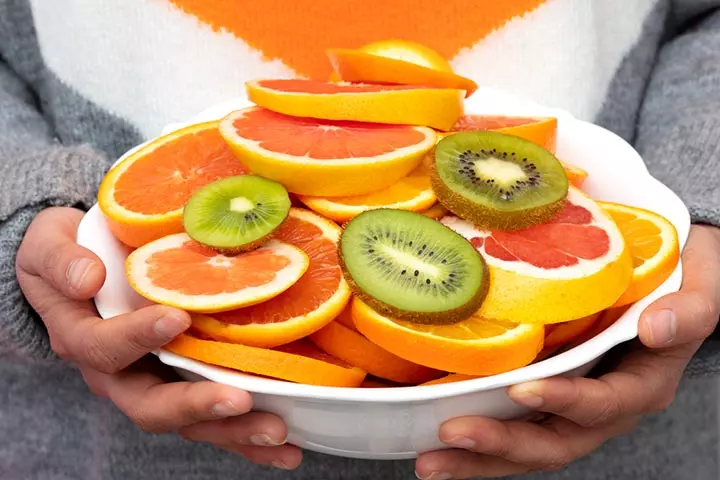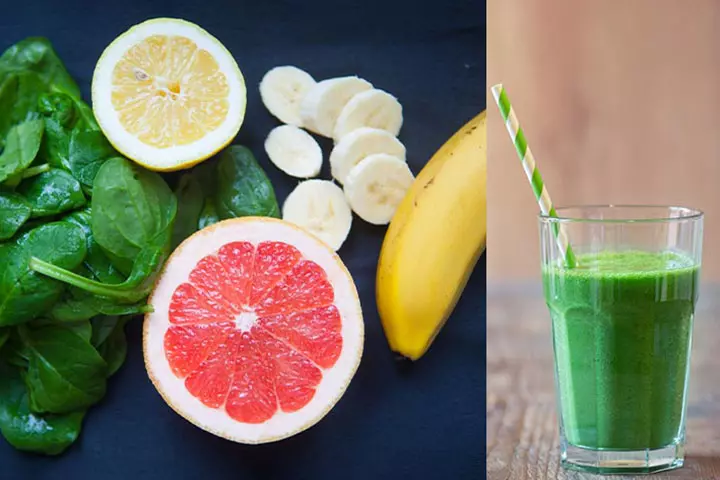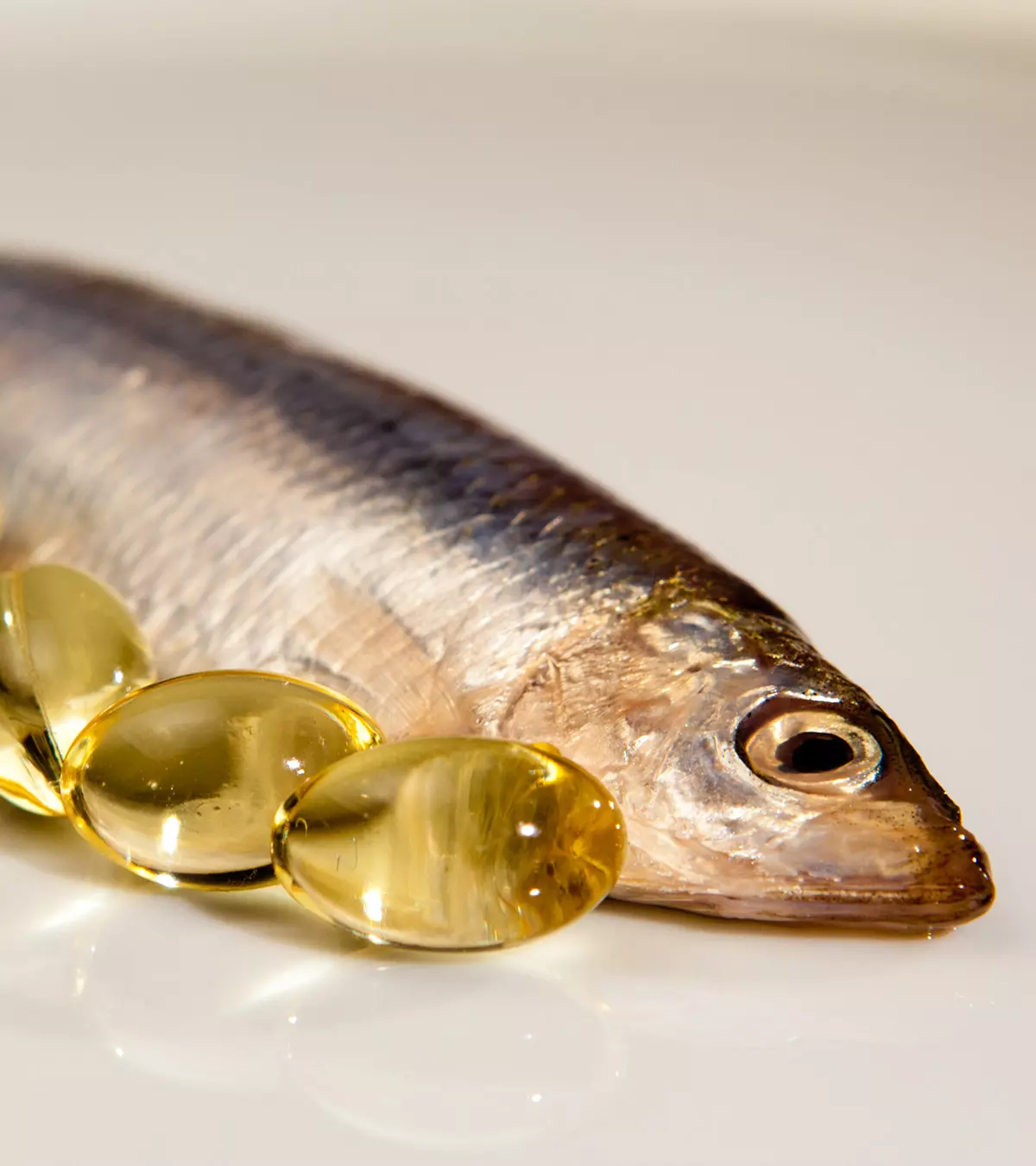
Image: ShutterStock
Grapefruit is a popular and healthy treat thanks to its medicinal and nutritional properties. Many folks prefer grapefruit since it is a cross between a pomelo and an orange. However, if you have just conceived a child, you might want to know if it is safe to consume grapefruit during pregnancy.

In this post, we tell you about the safety of eating grapefruit during pregnancy, including its health benefits and potential side effects. We also tell you how much grapefruit you should eat during pregnancy and safe ways to include it in your diet. Read on.
Key Pointers
- Grapefruit is rich in vitamin C and contributes to hydration, which is important during pregnancy.
- Grapefruit might help combat preeclampsia, insomnia, indigestion, and constipation in pregnant women.
- The fruit can be incorporated into salads, healthy mocktails, smoothies, or juices.
- However, it should be consumed in moderation as it may pose a risk of adverse effects when consumed with certain medications
Is It Safe To Eat Grapefruit During Pregnancy?
Yes, grapefruit is considered safe for consumption during pregnancy. The low-calorie, nutrient-rich fruit has a relatively higher nutrient density than fresh apple, banana, and peach and could be beneficial for prenatal health (1).
Grapefruit is not only delicious but also packed with essential nutrients such as B complex vitamins, folateiA form of vitamin B that occurs in some food items naturally and is required for the formation of DNA by the body. , fiber, calcium, and potassium, all of which are essential for you and the baby’s growth (2). The only thing you should worry about is how the fruit is grown: organic grapefruit varieties should be preferred, and the fruit washed properly before consumption. Unwashed produce may possibly contain harmful microbes, which could lead to foodborne illnesses.
Most people eat the fruit, while some prefer its juice.
Can You Drink Grapefruit Juice While Pregnant?

You can drink grapefruit juice only if it is pasteurized. Unpasteurized juices expose you to the risk of a possible bacterial infection that could be serious during pregnancy (3). However, this does not mean that processed and packed juices are 100% safe.
The consumption of juices in packaged bottles must be done cautiously, as they are made of concentrates that have almost negligible nutritional value. They may also have added sugars in them (4). While you prepare juice at home, remember not to strain it. This will ensure that you also get the fiber content of the fruit.
You can talk to a nutritionist before adding grapefruit juice to your diet. In any case, it is always advised to consume whole fruit over fruit juice.
Note: Grapefruit juice has been associated with drug interactions that could be lethal at times (5). Therefore, it is wise to consult with your doctor about the food safety of grapefruit juice if you are on medication.
If the doctor agrees, you could consume it as recommended. But how healthy is it for you? Find out about that next.
Nutritional Value of Grapefruit
| Nutrient | Amount | RDA (per day) |
|---|---|---|
| Water | 90g | – |
| Energy | 39Kcal | – |
| Carbohydrate, by difference | 9.2g | – |
| Calcium, Ca | 9mg | 1000mg |
| Iron, Fe | 0.2mg | 27mg |
| Magnesium, Mg | 12mg | 360mg |
| Phosphorus, P | 15mg | 700mg |
| Potassium, K | 162mg | 2900mg (AI) |
| Sodium, Na | 1mg | 200mg (7-12 months) |
| Vitamin C, total ascorbic acid | 38mg | 85mg |
| Folate, total | 10µg | 600 μg |
| Vitamin A, IU | 440 | 2567IU |
Health Benefits Of Eating Grapefruit While Pregnant

Grapefruit is a nutritious food with therapeutic properties. As one of the best fruits to eat during pregnancy, its consumption could be beneficial for the following reasons:
1. Preeclampsia
Preeclampsia is a condition that raises the risk of premature separation of the placenta from the uterus (before the baby is born), heavy bleeding, rupture of the liver, and in rare cases, death (8).
Grapefruit is believed to work effectively in controlling preeclampsia. The belief is based on the fact that grapefruit is a good source of potassium and flavonoids that could possibly help in regulating blood pressure. However, the clinical studies to mark the safety and efficacy of consumption of grapefruit or grapefruit juice to regulate blood pressure during pregnancy are sparse.
2. Insomnia
It is believed that grapefruit, when taken before bedtime, can possibly help relieve signs and symptoms of insomniaiA sleep disorder that makes it difficult for one to fall asleep, stay asleep, or get a sound sleep. , which most pregnant women suffer from. However, some studies show that it is not grapefruit but the essence of the flowers that help overcome insomnia (9).
Be cautious, and do not consume grapefruit before bedtime. It has high amounts of vitamin-C that tend to make the system acidic and cause heartburn. This could worsen insomnia (10).
3. Cholesterol
As per a research paper published in the Journal of Agricultural and Food Chemistry, eating one cup of fresh red grapefruit (or a half cup of fresh grapefruit juice) can keep the heart healthy by managing cholesterol levels. The red variety of grapefruit is considered to have higher antioxidant activity than the white variety (11).
Grapefruit is packed with antioxidants such as naringin and lycopene and has high fiber content. These nutritive properties are believed to help in managing cholesterol levels (12).
4. Healthy weight
Weight gain during pregnancy can be rapid or gradual. However, maintaining it within acceptable limits is crucial to have a concern free pregnancy.
Grapefruit is a low-calorie fruit that is nutrient-rich, especially vitamin-C. It has considerable fiber content too. All these properties make it a wise choice for weight management (6). However, the consumption must be moderate and in sync with the prescribed diet and lifestyle for a healthy weight gain.
5. Heartburn and indigestion
Heartburn and indigestioniA digestive tract disorder characterized by pain and discomfort in the upper abdomen. are not uncommon during pregnancy. They are some of the possible symptoms of turbulent hormonal changes happening in the body. In addition, as the uterus grows, the other organs in the body are cramped for space, which could also lead to heartburn and indigestion.
Grapefruit contains D-limonene. D-limonene has gastric acid-neutralizing properties, and it also normalizes the peristaltic movementiA term for the wave-like motion of muscles that transports food through the digestive tract. . These properties make it an effective choice to manage heartburn and indigestion during pregnancy (13). However, the time of consumption is important here. Grapefruit, if consumed raw or in juice form at night, can possibly worsen heartburn and indigestion.
 Quick fact
Quick fact6. Anemia
According to the World Health Organization (WHO), the global prevalence of anemia in pregnant women was 36.5% in 2019. While mild anemia during pregnancy is not uncommon, it is important to ensure that your diet includes the right foods to prevent its onset and manage the condition effectively. Grapefruit, being rich in vitamin C, helps your body absorb iron and, therefore, can possibly reduce the risk of anemia (14). However, managing anemia during pregnancy needs a more wholesome approach than just including fruits rich in vitamin C.
7. Asthma
Studies show that a diet rich in vitamin C can actually bring down the risk of developing asthma by developing the immune system. Considering that the baby’s development may be affected if the mom has asthma, its effective management is important (15). Grapefruit, with its abundant flavonoids and lycopene, could help in the management of asthma in pregnancy (16). However, scientific studies supporting this relation are limited.
8. Bone density
Some in-vivo studies show that regular consumption of grapefruit juice could help in maintaining bone densityiThe amount of bone mineral present in the bone tissues that help determine bone strength. . This effect is attributed to the presence of limonoids present in red grapefruit, which has high antioxidant activity. This property of red grapefruit has shown to slow down bone turnover (17) (18).
9. Constipation
It is important to stay hydrated through your pregnancy, especially during the summer months. Grapefruit has higher water content when compared to other fruits (91%) and is rich in electrolytes, which makes it an effective natural remedy for dehydration (19). Also, the high dietary fiber in this fruit can make it beneficial in managing constipation.
10. Cold and flu
Cold and flu during pregnancy are not uncommon, especially because the immunity could weaken at this time. Therefore, important bioactive compounds, such as vitamin C, play a vital role in maintaining immunity. One hundred grams of raw grapefruit contains 38 mg of vitamin C.
This is believed to help maintain immunity during pregnancy (20). In addition, grapefruit has antioxidant compounds such as flavonoids that also help in supporting immunity (21).
11. Diabetes and sugar problems
Gestational diabetes is often associated with increased birth weight in the baby and other labor complications. Grapefruit has a low glycemic index and low glycemic load and is also rich in antioxidants that make it an ideal choice for managing gestational diabetes (22).
A clinical study showed that fresh grapefruit juice not only improves insulin resistance but could also help in weight management (23). Thus, grapefruit can be considered effective in managing glucose levels. However, its safety and efficacy during pregnancy are not known.
 Health facts
Health factsAlthough consuming grapefruit could prove helpful during pregnancy, there are certain limitations you should know about.
Risk Of Eating Too Much Grapefruit During Pregnancy
Although grapefruit is low in fructose, its excessive consumption may be harmful to the placenta and alter fetal growth (24).
Also, eating grapefruit is not recommended if you have –
- Kidney or hepatic illnesses
- Stomach or duodenal ulcers
- CystitisiA condition characterized by inflammation of the inner lining of the bladder.
- A history of allergies
Grapefruit should not be eaten on an empty stomach or in combination with certain medications. Even otherwise, it is important to regulate the amount of grapefruit you eat every day.
How Much Grapefruit Is Safe During Pregnancy?
There is no known safe limit of intake for raw grapefruit, especially during pregnancy. The total fruit intake recommended per day during pregnancy is 2-4 servings (25). Therefore, keeping the moderation and variety principle in mind, you can have at least one serving of grapefruit a day.
Safe Ways To Include Grapefruit In A Pregnancy Diet

Grapefruit can be included in the following forms:
- Fresh juices, smoothies or fruit salads or grapefruit topped yogurt
- Healthy mocktails made with a combination of grapefruit with other fruits of your choice
- Tea; the fruit’s skin can be brewed to make a rejuvenating drink that helps fight nausea.
 Quick tip
Quick tipHere are a few grapefruit recipes that you may try when you are pregnant.
1. Grapefruit and peach salad

You will need:
- 1 large grapefruit
- 2 large peaches, ripened
- 1tbsp agave nectar
- ½tsp orange blossom water
- 10 mint leaves, fresh
- 50g pistachio nuts, finely chopped
How to:
- Combine agave nectar and orange blossom water in a small bowl.
- Remove the skin and pith of the grapefruit and cut it into slices.
- Slice the peaches and remove the pith.
- Mix all of these in the bowl.
- Add the mint and sprinkle chopped pistachios before serving the salad.
Preparation time –
5 minutes
Servings – 2
2. Grapefruit green smoothie

- 1 grapefruit, peeled and deseeded
- 1 sweet apple, peeled and cored
- 2 cups spinach
- 1 large banana, ripened
- 1-2 cup unsweetened almond milk, orange juice, and water
- 2-3 ice cubes
- 1/2tsp fresh ginger, peeled and chopped (optional)
How to:
- Add all the ingredients in a blender.
- Blend until you get a smooth and creamy consistency.
- Add more liquid or ice if it is too thick. Add apple or banana to sweeten.
Preparation time –
10 minutes
Servings – 2
If you still have concerns about this fruit’s consumption, check with your doctor before including it in your diet.
Frequently Asked Questions
1. Does craving grapefruit during pregnancy tell something about a baby’s gender?
According to old wives’ tales, craving sour foods such as grapefruits can indicate that you are carrying a boy. However, it is just one of the ways to guess the sex but not a reliable gender prediction method.
2. Is grapefruit seed extract safe during pregnancy?
Though grapefruit is safe during pregnancy, its seed or even fruit extract is not proven to be safe. The grapefruit seed extract is toxic to skin fibroblasts (cells within the dermis layeriA layer of skin between the topmost and innermost layers of the skin. ) and is best avoided.
3. Does grapefruit interfere with prenatal vitamins?
Grapefruit interacts with several medications, herbs, and supplements (29). Thus, you should speak with your doctor to know if the specific prenatal vitamins you are taking have any chance of cross-interaction with grapefruit.
4. What happens if I consume too much grapefruit?
Grapefruit is rich in fiber, and its excess consumption in sensitive individuals may lead to gastrointestinal issues, such as abdominal pain, gas, and diarrhea. Thus, one should consume grapefruit in moderation.
Having grapefruit during pregnancy is known to help manage blood pressure levels and also is a rich source of essential nutrients that aid the proper growth and development of the baby. However, it is recommended that you follow the dietary guidelines given by your doctor and consume it in limited amounts as too much of it might increase the risks of abnormal fetal growth and give rise to obstetric complications. You can include grapefruit in various ways in your diets, such as in juices, salads, or smoothies. But ensure that the juices are pasteurizediProducts that are made bacteria and pathogens-free by heating at controlled temperatures for a specific duration. and fresh to avoid the risks of infection.
Infographic: Eating Grapefruit During Pregnancy
Packed with essential vitamins and minerals, grapefruit can help support a healthy pregnancy and fetal development. So, whether you like the tangy flavor of grapefruit or looking for something new, check out the infographic below for interesting ways to eat grapefruit during pregnancy.
Some thing wrong with infographic shortcode. please verify shortcode syntax
Illustration: Is It Safe To Eat Grapefruit During Pregnancy?

Image: Dall·E/MomJunction Design Team
References
1. Mary M. Murphy et al.; Consumption of grapefruit is associated with higher nutrient intakes and diet quality among adults, and more favorable anthropometrics in women, NHANES 20032008; National Center For Biotechnology Information
2. Nutrient Intake & Diet Quality; Florida Department of Citrus
3. Pasteurized or unpasteurized juice – what’s the difference?; Michigan State University
4. Sandra B. Procter and Christina G. Campbell; Position of the Academy of Nutrition and Dietetics: Nutrition and Lifestyle for a Healthy Pregnancy Outcome; Journal of the Academy of Nutrition and Dietetics
5. Does grapefruit affect my medicine?; NHS
6. Grapefruit juice, pink, raw, (SR Legacy, 167774); Food Data Central; USDA
7. Micronutrient Needs During Pregnancy and Lactation; Oregon State University
8. High Blood Pressure in Pregnancy; Medline Plus; U.S National Library of Medicine
9. Grapefruit; Purdue University
10. 12 Foods That Sabotage Sleep; AARP
11. Red Grapefruit Appears To Lower Cholesterol, Fight Heart Disease; Science Daily
12. Grapefruit, the Great Fruit; University of California
13. Sun J; D-Limonene: safety and clinical applications.; National Center For Biotechnology Information
14. Lynch SR and Cook JD; Interaction of vitamin C and iron; National Center For Biotechnology Information
15. Minerbi-Codish I et al.; Influence of asthma in pregnancy on labor and the newborn.; National Center For Biotechnology Information
16. Banafshe Hosseini et al.; Effects of Fruit and Vegetable Consumption on Risk of Asthma, Wheezing and Immune Responses: A Systematic Review and Meta-Analysis; National Center For Biotechnology Information
17. Deyhim F et al.; Grapefruit juice modulates bone quality in rats.; National Center For Biotechnology Information
18. Orange, Grapefruit Juice For Breakfast Builds Bones In Rats; Science Daily
19. Hydrate with water and food; Michigan State University
20. Vitamin C in the Prevention and Treatment of the Common Cold; Pharmacy Review; National Center For Biotechnology Information
21. Seema Zargar et al.; Potentiating and synergistic effect of grapefruit juice on the antioxidant and anti-inflammatory activity of aripiprazole against hydrogen peroxide induced oxidative stress in mice; National Center For Biotechnology Information
22. Grapefruit; Defeat Diabetes Foundation
23. Fujioka K et al.; The effects of grapefruit on weight and insulin resistance: relationship to the metabolic syndrome.; National Center For Biotechnology Information
24. High-fructose diet during pregnancy may harm placenta, restrict fetal growth; Washington University School of Medicine
25. Diet During Pregnancy; American Pregnancy Association
26. Help for Morning Sickness; The Permanente Medical Group
27. Citrus Bioflavonoids; Winchester Hospital
28. Grapefruit; Center for Community Health; UC San Diego
29. Grapefruit; Medline Plus; U.S National Library of Medicine.
Community Experiences
Join the conversation and become a part of our nurturing community! Share your stories, experiences, and insights to connect with fellow parents.
Read full bio of Jyoti Benjamin
Read full bio of Swati Patwal
Read full bio of Rebecca Malachi
Read full bio of Aneesha Amonz
















